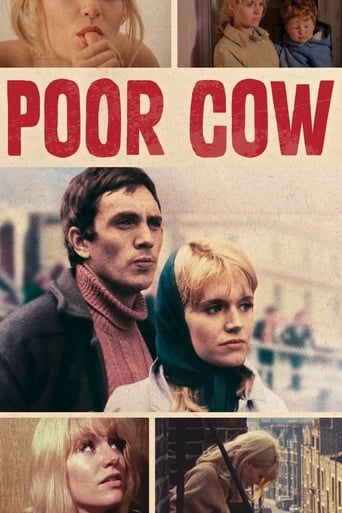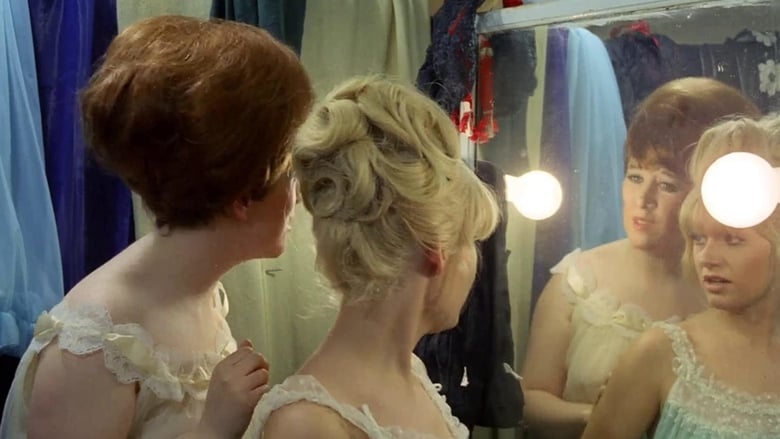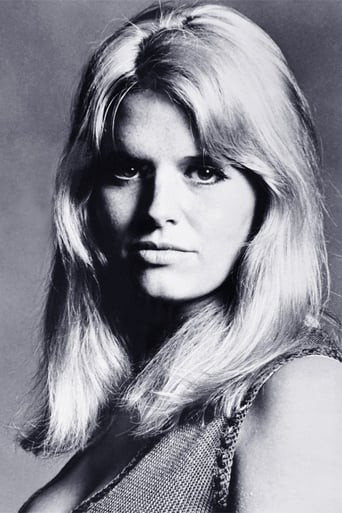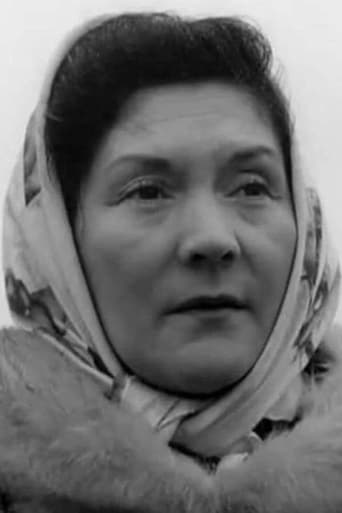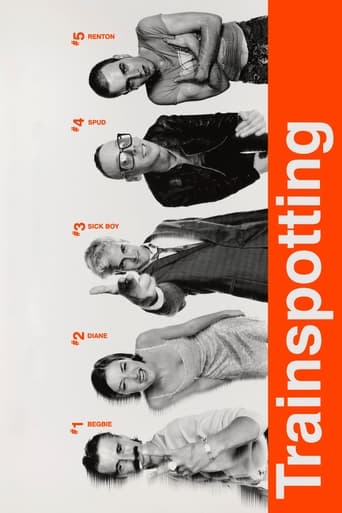Poor Cow (1968)
A young woman lives a life filled with bad choices. At a young age she marries and has a child--with an abusive thief who quickly ends up in prison. Left alone, she takes up with the guy's mate, another thief, who seems to give her some happiness but who also ends up locked up. She then takes up with a series of seedy types who offer nothing but momentary pleasure--if that.
Watch Trailer
Free Trial Channels
Cast


Similar titles
Reviews
Takes itself way too seriously
Crappy film
An absolute waste of money
It is not deep, but it is fun to watch. It does have a bit more of an edge to it than other similar films.
As mentioned elsewhere, I've been getting into the 'kitchen sink' dramas of Britain in the 1960s. Previously I've watched a handful of the early black and white ones, but POOR COW, the first film from long-time director Ken Loach, offered in a new wave of all-colour pictures that eventually heralded the way for the miserable likes of EASTENDERS and other soaps that came later. POOR COW is a product of its era and it shows, and that's what makes it interesting.The film is in essence the story of a young mother and her kid and their attempts to get by in a cruel and often harsh world. Carol White achieves level of naturalness in her performance that you don't often see, which means that she's utterly convincing. The male characters are presented as brutes, philanderers, or simply bland, cold men who don't care about the impact they make on people's lives. There's plenty of talent in the supporting cast, a lot of faces who would go on to become familiar on TV and in film, which makes this a fun watch despite the gruelling subject matter.The thing I found about POOR COW is that it kept me watching. I was always interested in finding out the outcome of the story, although any viewer will immediately realise that it's not going to be a happy ending. I was interested to note that the interlude in which White gets involved with a group of dodgy glamour photographers seemed to inspire a whole sub-genre of films directed by the likes of Norman J. Warren and Pete Walker. Apparently many of the scenes in the film were ad-libbed, which accounts for the slice-of-life realism of the piece.
I suppose you can watch 'Poor cow' in two stages.First of all, as a tale about an ordinary lower class girl who is severely tested in her efforts to make ends meet. Beautifully set in a 19-Sixties London working-class area, this film spares no effort to indulge you in the hard realism of her everyday's life. Also making you part of the girl's dreams about happiness and domestic stability -- not different from many other girls' dreams.After having laid such a solid bottom, 'Poor cow' invites you to connect its tale to the Swinging Sixties. A time when London was the epicenter of many freshly generated whirlwinds.Well, this film's statement seems clear to me: no Sixties-glitter & shine. 'Poor cow' tells us that even in the Sixties everyday life for common people went on as usual. Accentuated by music of Sixties' pop-icon Donovan, you may even detect that newly acquired Sixties-freedom primarily increased pressure on women to expose their nudity.----Apart from all this, 'Poor cow' deserves praise for its excellent acting + shooting. As well as for the credibility of its story -- in a Sixties-environment that surely warms the heart of everyone around at the time. Another Sixties-feature: the film shows a half naked young boy frontally. In 1967 nobody thought much about that, in our times this picture would probably have been censored as child pornography.
You know what to expect when the first scene in Ken Loach's "Poor Cow" is a graphic image of Carol White's character giving birth to her son, although for my taste this was taking documentary realism to extremes. For the remainder of the film we follow White's progress, if that's the right word, for the next few years as she lives a mostly tawdry life on the edge of both poverty and legality, interacting with a mostly dubious set of individuals in not-so-swinging London in the mid-60's.The narrative is somewhat awkwardly interspersed with chapter plates, presumably written by White, although these don't actually aid the structure of the piece as the film progresses pretty much on a tangential basis although as an insight into her character's naive optimism and childlike simplicity, they may serve some purpose. Loach's soon to be trademark fly-on-the-wall camera-work is never still, long-shots, extreme close-ups, walking shots, tracking shots all to convince us like his acclaimed TV documentary "Cathy Come Home", of the previous year (with the same actress in the lead) of the veracity of his subject, stripping away all cinematic artifice. In this he succeeds, inviting no pity for her, only portraying her making do and working with what she has, with little prospect of escape.Of course this unremittingly bleak outlook can be overbearing and cold and there are many scenes where he could and should have called "Cut!" earlier, but as an insight into the working class of supposedly affluent Britain, it's important to hold up a mirror to society as he does here.In the final scenes, when White is reunited with her temporarily lost child, we are brought full-circle to that shocking opening scene as he reminds us that family love is perhaps the only true love. Whether it will be enough of a basis for White to break out and make a life for herself and her son is debatable so that some sort of a sequel might have been interesting to consider.The cast is an interesting with one with Terence Stamp demonstrating his range as the crook who White falls for and who shows her a kind of loving, even as the film makes clear in the only stagy scene in the film, his courtroom trial, that there are no victimless crimes. As in "Cathy Come Home", White holds the viewer's attention with her disarming honesty, vulnerability and spirit. Interesting to see the notorious John Pindin in a prominent role too.You don't watch a Loach film for comfortable viewing but as an agent-provocateur, turning over stones most would step over, he's an important director in British cinema.
Loach's film attempts to depict the sorry life of Joy, a young woman involved in the shady world of criminals and petty crime. How sorry one can feel for Joy is debatable as it is a life she has freely become associated with, first through her marriage to Tom and later, when Tom is imprisoned, through her relationship with his mate, Dave. What is so interesting about the film is the settings, Loach's realistic style and the naturalness of the key performances. Having an almost documentary feel about it - the (possibly unintentional) intrusion of the boom mike in one scene adds to this style. Also the street scenes of the kids playing in an alley comparable to a "20 yard toilet" could have been filmed in any run-down working class tenement block of the sixties. The film itself had a raw energy, especially when Joy is searching for her son amongst the demolished houses. Loach manages to present a realistic portrayal of working class urban life during 60's Britain which is well worth a look at.

